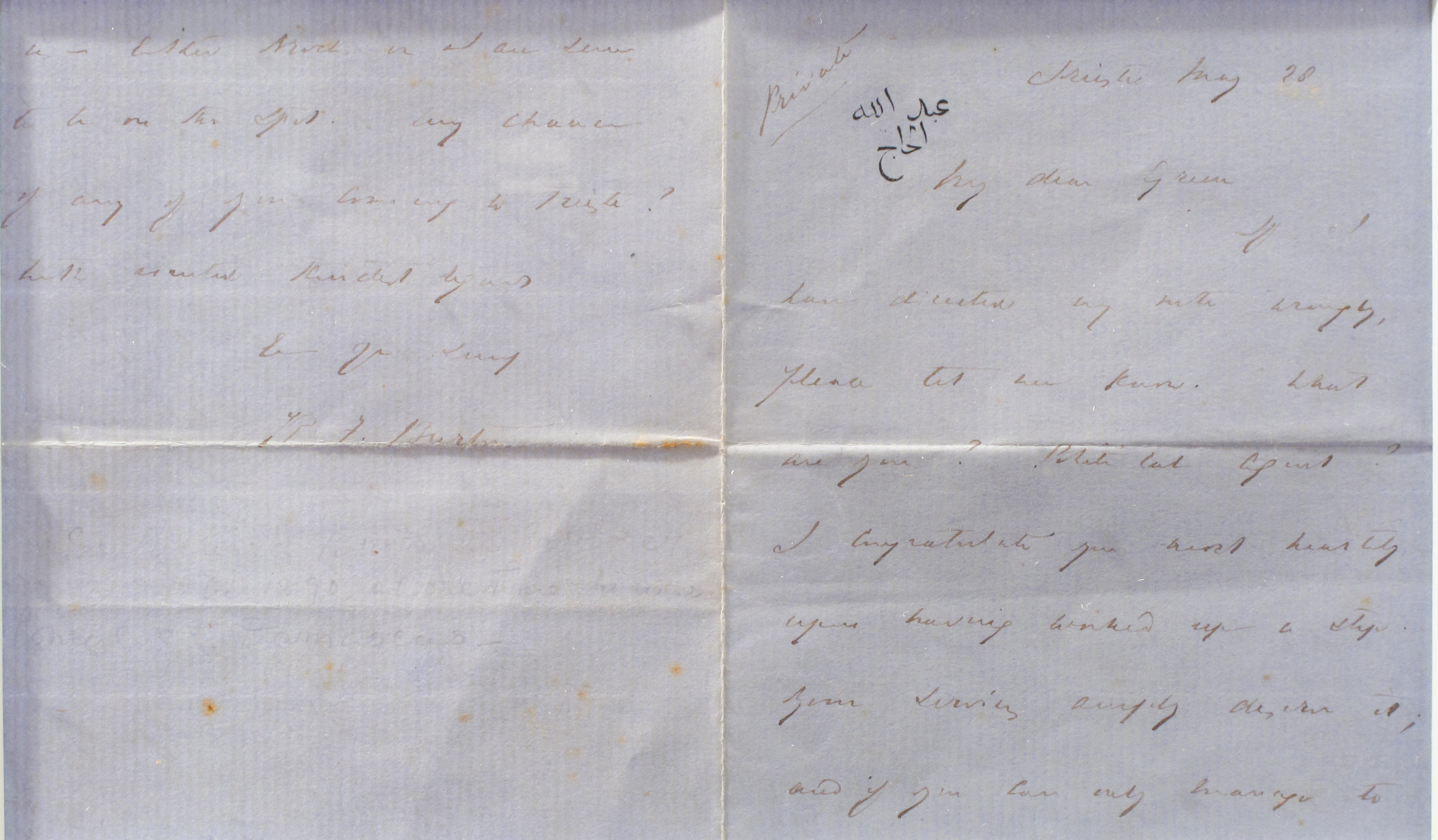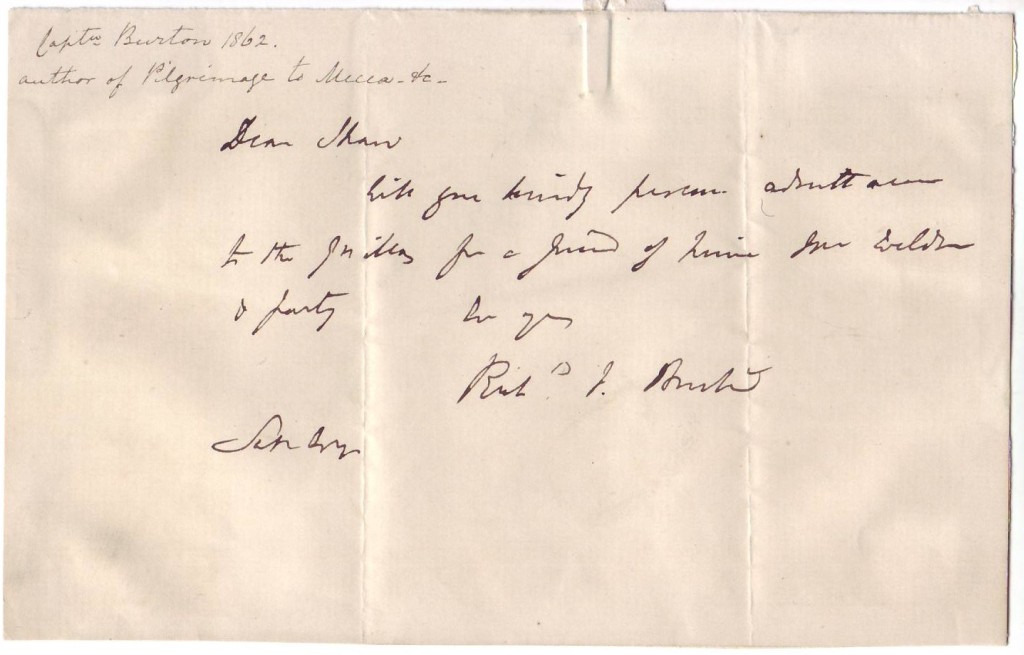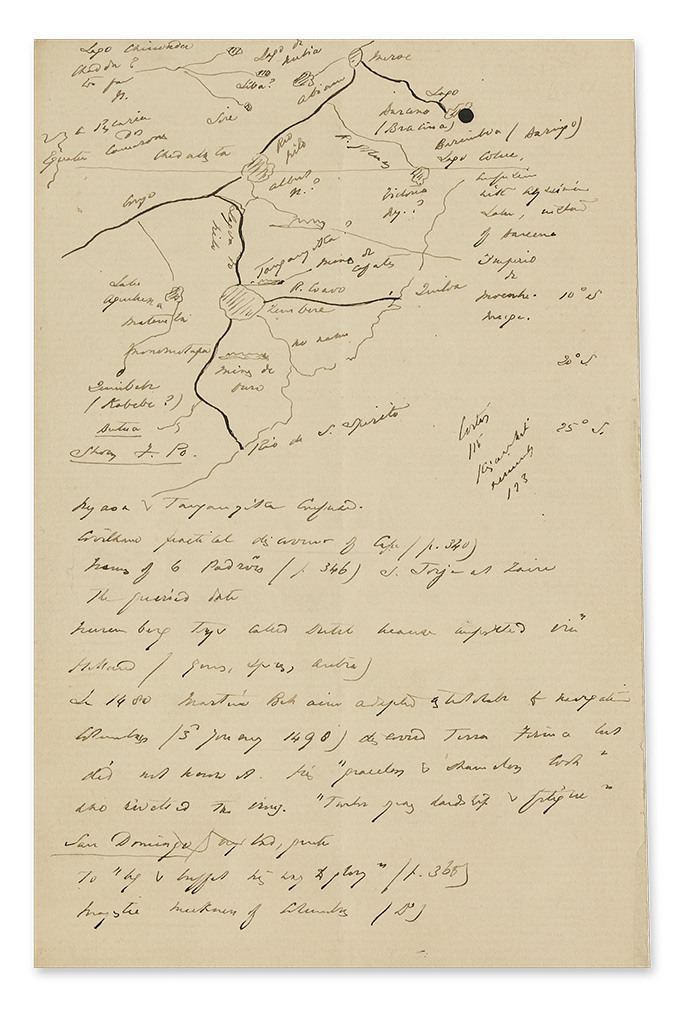BURTON, Richard Francis (1821-1890). Autograph manuscript of The Uruguay , a Historical Romance of South America by Jose Basilio da Gama. Translated Metrically with notes and a biographical notice of the author by Richard F. Burton, signed by Burton on the first page, and on page 5 at the end of the preface in purple ink – “Biographical Notice…” signed by Burton on the last page. N.p., n.d. [Santos and Sao Paulo, ca 1867-68]. The manuscript comprises: Preface (pp. 1-5); the text of the poem, including Burton’s synopses of each canto (pp. 6-65); Notes (pp. 66-94); Biographical Notice: The Man (pp. 96-124); The Poet (pp. 125-140); Epilogue (pp. 141-154). Together 156 pages (pages 38 and 39 appear twice) plus title, consecutively numbered, 4to, in black ink with extensive revisions in purple ink and pencil and deletions mostly on rectos, first part bound in cloth backed boards, second part bifolio pricked for gathering, some light rubbing to boards, first and last leaf of bifolio loss; housed together in morocco backed folding case. Provenance : Sir Richard Burton; Lady (Isabel) Burton (1831-1896); Mrs Elizabeth Fitzgerald (her sister and literary executor, d.1902); a London bookseller (see Penzer 184); John B. Stetson Collection (his sale Park-Bernet Galleries New York, 14 April 1953, lot 157). BURTON’S REDISCOVERED MANUSCRIPT OF HIS TRANSLATION OF THE URUGUAY , WITH THE UNPUBLISHED TRANSLATOR’S FOOTNOTES. ONE OF A FEW SUBSTANTIAL AUTOGRAPH MANUSCRIPTS BY SIR RICHARD BURTON REMAINING IN PRIVATE HANDS. José Basílio da Gama (1740-1795) was a Brazilian poet and member of the Society of Jesus, he was born in the colony of Brazil, and his most important work is the epic poem O Uraguai published in 1769. The poem tells the story of the end of the Guaranitic or Jesuit war (1754-1759) and focuses on the slavery of the Guarani people, which was imposed by the Society of Jesus. Burton describes the historical background of the war, discusses the individual Cantos of the poem and explains: “Let us, then, begin with the text of the favourite Brazilian Romantic Epic or rather Epic Romance… following with copious notations for the student’s use derived by the author from a various sources and ending with a biography of the Poet” (Burton, preface). Richard Burton had an extraordinary knowledge of languages. Apart from translating The Arabian Nights (1885), he translated from the Portuguese. He had first studied Portuguese as a young army officer in Goa 1846. In addition to Gama’s poem he also translated The Lusiads , the Portuguese national epic by Luís de Camões. The preface to The Uruguay ends with a remark on translating a work of poetry: “I will conclude this preamble with the words of Victor Hugo no mean judge in such matters: ‘to translate a foreign poet is to enrich the national literature.’ Richard F. Burton.” As a member of the Foreign Service, Burton was transferred to Santos Brazil in 1865. He traveled through Brazil’s central highlands, and in 1868-69 report on the long, bloody boundary war which pitted Brazil, Argentina and Uruguay (supported by Britain) against Paraguay and its dictator (supported by the United States). He described his observations in his Letters from the Battlefields of Paraguay (1870). During his time in Brazil Burton worked on his translation of The Uruguay. “Richard wrote to Albert Tootal in February [1868] ‘here is a chronic state of death. I have finished my translation of Uruguay and am copying it out for print. My daily work begins at 6 a.m. and ends at 10 p.m.; there is an immensity of reading to be done before one can write about the Brazil’” (Lovell p. 481). (Penzer dates the work “at about 1878.”) The history of the manuscript after Isabel Burton's death was eventful. The trustees of her will included her nephew, Gerald Arthur Arundell (15th Baron Arundell of Wardour, 1869-1939). Her sister, Mrs Elizabeth Fitzgerald, her secretary, Miss Plowman and W.A. Coote were appointed her literary executo
BURTON, Richard Francis (1821-1890). Autograph manuscript of The Uruguay , a Historical Romance of South America by Jose Basilio da Gama. Translated Metrically with notes and a biographical notice of the author by Richard F. Burton, signed by Burton on the first page, and on page 5 at the end of the preface in purple ink – “Biographical Notice…” signed by Burton on the last page. N.p., n.d. [Santos and Sao Paulo, ca 1867-68]. The manuscript comprises: Preface (pp. 1-5); the text of the poem, including Burton’s synopses of each canto (pp. 6-65); Notes (pp. 66-94); Biographical Notice: The Man (pp. 96-124); The Poet (pp. 125-140); Epilogue (pp. 141-154). Together 156 pages (pages 38 and 39 appear twice) plus title, consecutively numbered, 4to, in black ink with extensive revisions in purple ink and pencil and deletions mostly on rectos, first part bound in cloth backed boards, second part bifolio pricked for gathering, some light rubbing to boards, first and last leaf of bifolio loss; housed together in morocco backed folding case. Provenance : Sir Richard Burton; Lady (Isabel) Burton (1831-1896); Mrs Elizabeth Fitzgerald (her sister and literary executor, d.1902); a London bookseller (see Penzer 184); John B. Stetson Collection (his sale Park-Bernet Galleries New York, 14 April 1953, lot 157). BURTON’S REDISCOVERED MANUSCRIPT OF HIS TRANSLATION OF THE URUGUAY , WITH THE UNPUBLISHED TRANSLATOR’S FOOTNOTES. ONE OF A FEW SUBSTANTIAL AUTOGRAPH MANUSCRIPTS BY SIR RICHARD BURTON REMAINING IN PRIVATE HANDS. José Basílio da Gama (1740-1795) was a Brazilian poet and member of the Society of Jesus, he was born in the colony of Brazil, and his most important work is the epic poem O Uraguai published in 1769. The poem tells the story of the end of the Guaranitic or Jesuit war (1754-1759) and focuses on the slavery of the Guarani people, which was imposed by the Society of Jesus. Burton describes the historical background of the war, discusses the individual Cantos of the poem and explains: “Let us, then, begin with the text of the favourite Brazilian Romantic Epic or rather Epic Romance… following with copious notations for the student’s use derived by the author from a various sources and ending with a biography of the Poet” (Burton, preface). Richard Burton had an extraordinary knowledge of languages. Apart from translating The Arabian Nights (1885), he translated from the Portuguese. He had first studied Portuguese as a young army officer in Goa 1846. In addition to Gama’s poem he also translated The Lusiads , the Portuguese national epic by Luís de Camões. The preface to The Uruguay ends with a remark on translating a work of poetry: “I will conclude this preamble with the words of Victor Hugo no mean judge in such matters: ‘to translate a foreign poet is to enrich the national literature.’ Richard F. Burton.” As a member of the Foreign Service, Burton was transferred to Santos Brazil in 1865. He traveled through Brazil’s central highlands, and in 1868-69 report on the long, bloody boundary war which pitted Brazil, Argentina and Uruguay (supported by Britain) against Paraguay and its dictator (supported by the United States). He described his observations in his Letters from the Battlefields of Paraguay (1870). During his time in Brazil Burton worked on his translation of The Uruguay. “Richard wrote to Albert Tootal in February [1868] ‘here is a chronic state of death. I have finished my translation of Uruguay and am copying it out for print. My daily work begins at 6 a.m. and ends at 10 p.m.; there is an immensity of reading to be done before one can write about the Brazil’” (Lovell p. 481). (Penzer dates the work “at about 1878.”) The history of the manuscript after Isabel Burton's death was eventful. The trustees of her will included her nephew, Gerald Arthur Arundell (15th Baron Arundell of Wardour, 1869-1939). Her sister, Mrs Elizabeth Fitzgerald, her secretary, Miss Plowman and W.A. Coote were appointed her literary executo
BURTON, Richard Francis (1821-1890). Autograph manuscript of The Uruguay , a Historical Romance of South America by Jose Basilio da Gama. Translated Metrically with notes and a biographical notice of the author by Richard F. Burton, signed by Burton on the first page, and on page 5 at the end of the preface in purple ink – “Biographical Notice…” signed by Burton on the last page. N.p., n.d. [Santos and Sao Paulo, ca 1867-68]. The manuscript comprises: Preface (pp. 1-5); the text of the poem, including Burton’s synopses of each canto (pp. 6-65); Notes (pp. 66-94); Biographical Notice: The Man (pp. 96-124); The Poet (pp. 125-140); Epilogue (pp. 141-154). Together 156 pages (pages 38 and 39 appear twice) plus title, consecutively numbered, 4to, in black ink with extensive revisions in purple ink and pencil and deletions mostly on rectos, first part bound in cloth backed boards, second part bifolio pricked for gathering, some light rubbing to boards, first and last leaf of bifolio loss; housed together in morocco backed folding case. Provenance : Sir Richard Burton; Lady (Isabel) Burton (1831-1896); Mrs Elizabeth Fitzgerald (her sister and literary executor, d.1902); a London bookseller (see Penzer 184); John B. Stetson Collection (his sale Park-Bernet Galleries New York, 14 April 1953, lot 157). BURTON’S REDISCOVERED MANUSCRIPT OF HIS TRANSLATION OF THE URUGUAY , WITH THE UNPUBLISHED TRANSLATOR’S FOOTNOTES. ONE OF A FEW SUBSTANTIAL AUTOGRAPH MANUSCRIPTS BY SIR RICHARD BURTON REMAINING IN PRIVATE HANDS. José Basílio da Gama (1740-1795) was a Brazilian poet and member of the Society of Jesus, he was born in the colony of Brazil, and his most important work is the epic poem O Uraguai published in 1769. The poem tells the story of the end of the Guaranitic or Jesuit war (1754-1759) and focuses on the slavery of the Guarani people, which was imposed by the Society of Jesus. Burton describes the historical background of the war, discusses the individual Cantos of the poem and explains: “Let us, then, begin with the text of the favourite Brazilian Romantic Epic or rather Epic Romance… following with copious notations for the student’s use derived by the author from a various sources and ending with a biography of the Poet” (Burton, preface). Richard Burton had an extraordinary knowledge of languages. Apart from translating The Arabian Nights (1885), he translated from the Portuguese. He had first studied Portuguese as a young army officer in Goa 1846. In addition to Gama’s poem he also translated The Lusiads , the Portuguese national epic by Luís de Camões. The preface to The Uruguay ends with a remark on translating a work of poetry: “I will conclude this preamble with the words of Victor Hugo no mean judge in such matters: ‘to translate a foreign poet is to enrich the national literature.’ Richard F. Burton.” As a member of the Foreign Service, Burton was transferred to Santos Brazil in 1865. He traveled through Brazil’s central highlands, and in 1868-69 report on the long, bloody boundary war which pitted Brazil, Argentina and Uruguay (supported by Britain) against Paraguay and its dictator (supported by the United States). He described his observations in his Letters from the Battlefields of Paraguay (1870). During his time in Brazil Burton worked on his translation of The Uruguay. “Richard wrote to Albert Tootal in February [1868] ‘here is a chronic state of death. I have finished my translation of Uruguay and am copying it out for print. My daily work begins at 6 a.m. and ends at 10 p.m.; there is an immensity of reading to be done before one can write about the Brazil’” (Lovell p. 481). (Penzer dates the work “at about 1878.”) The history of the manuscript after Isabel Burton's death was eventful. The trustees of her will included her nephew, Gerald Arthur Arundell (15th Baron Arundell of Wardour, 1869-1939). Her sister, Mrs Elizabeth Fitzgerald, her secretary, Miss Plowman and W.A. Coote were appointed her literary executo
BURTON, Richard Francis (1821-1890). Autograph manuscript of The Uruguay , a Historical Romance of South America by Jose Basilio da Gama. Translated Metrically with notes and a biographical notice of the author by Richard F. Burton, signed by Burton on the first page, and on page 5 at the end of the preface in purple ink – “Biographical Notice…” signed by Burton on the last page. N.p., n.d. [Santos and Sao Paulo, ca 1867-68]. The manuscript comprises: Preface (pp. 1-5); the text of the poem, including Burton’s synopses of each canto (pp. 6-65); Notes (pp. 66-94); Biographical Notice: The Man (pp. 96-124); The Poet (pp. 125-140); Epilogue (pp. 141-154). Together 156 pages (pages 38 and 39 appear twice) plus title, consecutively numbered, 4to, in black ink with extensive revisions in purple ink and pencil and deletions mostly on rectos, first part bound in cloth backed boards, second part bifolio pricked for gathering, some light rubbing to boards, first and last leaf of bifolio loss; housed together in morocco backed folding case. Provenance : Sir Richard Burton; Lady (Isabel) Burton (1831-1896); Mrs Elizabeth Fitzgerald (her sister and literary executor, d.1902); a London bookseller (see Penzer 184); John B. Stetson Collection (his sale Park-Bernet Galleries New York, 14 April 1953, lot 157). BURTON’S REDISCOVERED MANUSCRIPT OF HIS TRANSLATION OF THE URUGUAY , WITH THE UNPUBLISHED TRANSLATOR’S FOOTNOTES. ONE OF A FEW SUBSTANTIAL AUTOGRAPH MANUSCRIPTS BY SIR RICHARD BURTON REMAINING IN PRIVATE HANDS. José Basílio da Gama (1740-1795) was a Brazilian poet and member of the Society of Jesus, he was born in the colony of Brazil, and his most important work is the epic poem O Uraguai published in 1769. The poem tells the story of the end of the Guaranitic or Jesuit war (1754-1759) and focuses on the slavery of the Guarani people, which was imposed by the Society of Jesus. Burton describes the historical background of the war, discusses the individual Cantos of the poem and explains: “Let us, then, begin with the text of the favourite Brazilian Romantic Epic or rather Epic Romance… following with copious notations for the student’s use derived by the author from a various sources and ending with a biography of the Poet” (Burton, preface). Richard Burton had an extraordinary knowledge of languages. Apart from translating The Arabian Nights (1885), he translated from the Portuguese. He had first studied Portuguese as a young army officer in Goa 1846. In addition to Gama’s poem he also translated The Lusiads , the Portuguese national epic by Luís de Camões. The preface to The Uruguay ends with a remark on translating a work of poetry: “I will conclude this preamble with the words of Victor Hugo no mean judge in such matters: ‘to translate a foreign poet is to enrich the national literature.’ Richard F. Burton.” As a member of the Foreign Service, Burton was transferred to Santos Brazil in 1865. He traveled through Brazil’s central highlands, and in 1868-69 report on the long, bloody boundary war which pitted Brazil, Argentina and Uruguay (supported by Britain) against Paraguay and its dictator (supported by the United States). He described his observations in his Letters from the Battlefields of Paraguay (1870). During his time in Brazil Burton worked on his translation of The Uruguay. “Richard wrote to Albert Tootal in February [1868] ‘here is a chronic state of death. I have finished my translation of Uruguay and am copying it out for print. My daily work begins at 6 a.m. and ends at 10 p.m.; there is an immensity of reading to be done before one can write about the Brazil’” (Lovell p. 481). (Penzer dates the work “at about 1878.”) The history of the manuscript after Isabel Burton's death was eventful. The trustees of her will included her nephew, Gerald Arthur Arundell (15th Baron Arundell of Wardour, 1869-1939). Her sister, Mrs Elizabeth Fitzgerald, her secretary, Miss Plowman and W.A. Coote were appointed her literary executo





.jpg)








Testen Sie LotSearch und seine Premium-Features 7 Tage - ohne Kosten!
Lassen Sie sich automatisch über neue Objekte in kommenden Auktionen benachrichtigen.
Suchauftrag anlegen